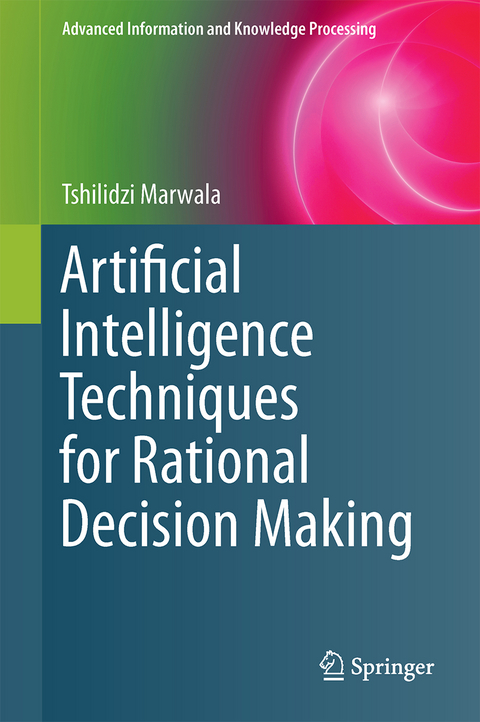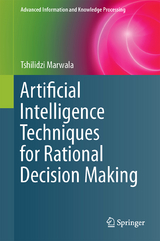Artificial Intelligence Techniques for Rational Decision Making
Springer International Publishing (Verlag)
978-3-319-11423-1 (ISBN)
Develops insights into solving complex problems in engineering, biomedical sciences, social science and economics based on artificial intelligence. Some of the problems studied are in interstate conflict, credit scoring, breast cancer diagnosis, condition monitoring, wine testing, image processing and optical character recognition. The author discusses and applies the concept of flexibly-bounded rationality which prescribes that the bounds in Nobel Laureate Herbert Simon's bounded rationality theory are flexible due to advanced signal processing techniques, Moore's Law and artificial intelligence.
Artificial Intelligence Techniques for Rational Decision Making examines and defines the concepts of causal and correlation machines and applies the transmission theory of causality as a defining factor that distinguishes causality from correlation. It develops the theory of rational counterfactuals which are defined as counterfactuals that are intended to maximize theattainment of a particular goal within the context of a bounded rational decision making process. Furthermore, it studies four methods for dealing with irrelevant information in decision making:
- Theory of the marginalization of irrelevant information
- Principal component analysis
- Independent component analysis
- Automatic relevance determination method
In addition it studies the concept of group decision making and various ways of effecting group decision making within the context of artificial intelligence.
Rich in methods of artificial intelligence including rough sets, neural networks, support vector machines, genetic algorithms, particle swarm optimization, simulated annealing, incremental learning and fuzzy networks, this book will be welcomed by researchers and students working in these areas.
Tshilidzi Marwala is the Executive Dean of the Faculty of Engineering and the Built Environment at the University of Johannesburg. He was previously the Adhominem Professor of Electrical Engineering as well as the Carl and Emily Fuchs Chair of Systems and Control Engineering at the University of the Witwatersrand. He is a Fellow of the Royal Society of Arts as well as the Royal Statistical Society. He holds a PhD in Engineering from the University of Cambridge and a PLD from Harvard University in the USA. He was a post-doctoral research associate at Imperial College working in the general area of computational intelligence. He has been a visiting fellow at Harvard University and Cambridge University. His research interests include the application of computational intelligence to mechanical. civil, aerospace and biomedical engineering. Professor Marwala has made fundamental contributions to engineering including the development of the concept of pseudo-modal energies and the development of Bayesian framework for solving engineering problems such as finite element model updating. He has supervised 40 masters and PhD students many of whom have proceeded to distinguish themselves at universities such as Harvard, Oxford and Cambridge. He has published over 200 papers in journals such as the American Institute of Aeronautics and Astronautics Journal, proceedings and book chapters. He has published two books: Computational Intelligence for Modelling Complex Systems published by Research India Publications as well as Computational Intelligence for Missing Data Imputation, Estimation, and Management: Knowledge Optimization Techniques published by the IGI Global Publications (New York). His work has appeared in prestigious publications such as New Scientist. He is a senior member of the IEEE.
Introduction to Rational Decision Making.- Casual Function for Rational Decision Making: Application to Militarized Interstate Disputes.- Correlation Function for Rational Decision Making: Application to Epileptic Activity.- Missing Data Approaches for Rational Decision Making: Application to Anecdotal Data.- Rational Counterfactuals and Decision Making: Application to Interstate Conflict.- Flexibility-Bounded Rationality in Interstate Conflict.- Filtering Irrelevant Information for Rational Decision Making.- Group Decision Making.- Conclusion.- Appendix A: Fourier Transform, Wavelet Transform, Modal Properties and Pseudo-Modal Energies.- Appendix B: Committee of Networks.
"Each chapter introduces a topic, discusses the theory for implementing it, and then describes a use case and the results of its application. ... This is an important book. ... Copious references, several pages per chapter, provide voluminous background material for the curious reader." (G. R. Mayforth, Computing Reviews, December, 2015)
| Erscheint lt. Verlag | 3.11.2014 |
|---|---|
| Reihe/Serie | Advanced Information and Knowledge Processing |
| Zusatzinfo | XV, 168 p. 35 illus. |
| Verlagsort | Cham |
| Sprache | englisch |
| Maße | 155 x 235 mm |
| Gewicht | 444 g |
| Themenwelt | Informatik ► Theorie / Studium ► Künstliche Intelligenz / Robotik |
| Schlagworte | Artificial Intelligence • Causality • Correlation • Decision making framework • Flexibly-bounded rationality |
| ISBN-10 | 3-319-11423-9 / 3319114239 |
| ISBN-13 | 978-3-319-11423-1 / 9783319114231 |
| Zustand | Neuware |
| Haben Sie eine Frage zum Produkt? |
aus dem Bereich




